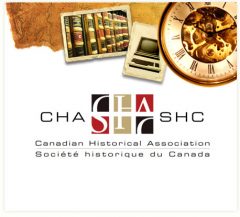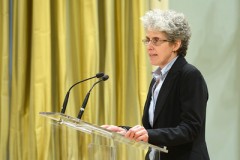Dominique Marshall Participates in CHA Roundtable

The Canadian Historical Association (CHA) has just posted the recording of a recent roundtable on “Rethinking the Undergraduate Canadian History Survey” on their YouTube channel.
The participants were as follows: Laura Ishiguro, Jamie Murton, Angela Tozer, Dominique Marshall, Mark Leier, Michael Dawson, and Chair: Funké Aladejebi.
Thanks to the presence of seven dynamic and proactive panelists before an audience of sixty, the Canadian Historical Association’s first Round Table engaged with a world of ideas about teaching the undergraduate Canadian History survey course. If there was one constant, it was the myriad of perspectives and possibilities. What is Canadian history? That is the ultimate question most Canadian history survey courses ask. This frame of analysis can make it difficult to teach such a complex history, so our panelists presented a panoply of reflections and ideas.
The panelists argued that periodization and frames of analysis must be strongly considered to teach a fair and representative Canadian history. One of the frames most often adopted – and appreciated by students – is imperialism. Introducing Canadian history using imperialism’s preconceptions allows us to present a common-sense history about structural power dynamics and restitution’s central place in the narrative. But imperialism was not the only frame used by our panelists. Others used key events in Canadian history to impart the knowledge every student needs; others combined chronological and thematic approaches to better advance essential aspects of Canadian history, or make the survey as exhaustive as possible.

Beyond subject matter, the panelists argued the course should be constructed in a way that accommodates a variety of students, from all backgrounds. A growing interest in contemporary questions directly anchored in history, combined with a lowering history enrolment rate, means not all students are already versed in history. This leads to different perspectives on the course’s role. For some panelists, the course is an entry toward more advanced studies; but for others, it must be an encompassing way to understand the essence of Canadian society, both historically and today.
The panelists also argued the Canadian history survey course should nurture critical thinking and spotlight the discipline’s research methodology. With that in mind, they discussed what sort of lectures and evaluations they assigned. Although some argued for academic texts, some course directors were assigning non-academic texts to enlarge the subject’s scope. Regarding evaluations, the panelists tended to assign work that familiarized students with the methods and challenges of the discipline, in the hopes this knowledge can be later mobilized, whatever their futures.
We can realize that there is no perfect formula to building a great Canadian history survey course. The challenges are enormous: subject, theory, and practical considerations meet and mix to build something students find accessible and relatable. There was no single format the panelists all agreed on, but their additional perspectives can only inspire students and teachers.
We hope that you enjoy the presentations!